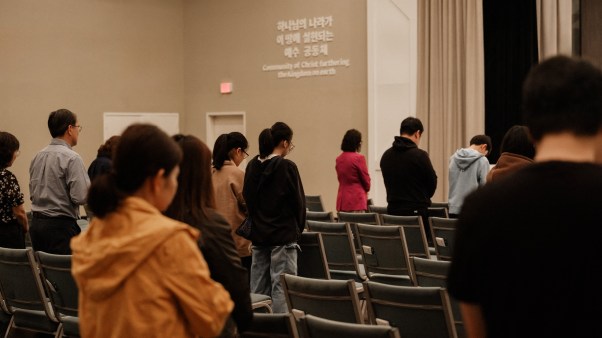When my 16-year-old daughter told me a boy had asked her out on a date, my first thought was, Good! At least one kid at that school isn’t an idiot.
Not the typical response, perhaps, but I’m a proud father of an incredible girl. She’s funny, kind, beautiful, smart, and interesting. I’m surprised boys aren’t asking her out every week (which tells me more about them than about her).
But my next thought came quickly: I need to know some things about this guy.
While I was delighted that he saw a sliver of what I see in her, she’s so important to me that I’m not going to entrust her to just anybody.
This combined feeling of pride and protectiveness is also how I feel when I meet new guests at our church. I’m thrilled they feel drawn to what makes our community special—it’s a validation of something I deeply believe in. I would be part of it even if I wasn’t the pastor. At the same time, I feel that shepherd’s instinct to protect what we’ve built. We have a good thing going. And just like with my daughter’s potential date, there are things I want to know before we get further into this relationship. Our church family is precious to me, and understanding who’s joining us matters.
In my previous article, we explored what questions guests are asking themselves when they visit our churches. Now let’s flip the script. What questions should we be asking them when they visit?
Honing the art of asking good questions serves multiple purposes for us as pastors. It helps us welcome guests more effectively (which naturally leads to more people being invited), but it also helps us gather crucial insights that allow us to connect them more meaningfully into the life of our church and enfold them into the flock. In some cases, thoughtful questions also serve as a protective measure, allowing us to be on guard against potential dangers that may disrupt what God is building.
As a pastor, here are three questions I love to ask those who are newer to our church:
1. After you came the first time, why did you come back?
Of course, I love to know how people ended up at our church the first time. But even more interesting is why they came back a second time.
Consider the difference:
When you ask: “How did you find us?”
They might answer: “My coworker invited me.”
But when you ask: “Why did you come back?”
They might say: “The sermon spoke directly to a struggle I’ve been having at home.”
See the difference? The first question tells you something about your outreach channels. The second reveals what actually matters to them personally. You might learn not just about your ministry’s effectiveness but about where this person is in their spiritual journey.
You’ll learn that guests come back for all sorts of different reasons. Some return because of the preaching. Others come back because they felt genuinely welcomed or met some potential new friends. Still others are drawn to a specific program or ministry experience that met a need in their lives.
Each of these responses reveal something valuable—both about your church’s strengths and about the unique people God is sending your way.
Over time, you are likely to notice trends and themes. You’ll start getting similar answers. As patterns emerge, you learn more about what is actually helping people “stick” at your church. You can then intentionally leverage those dynamics to encourage even more spiritual depth and numerical growth.
2. Have you had a church home before this?
While follow-up questions will be necessary to get the full picture, experienced pastors can quickly discern patterns that provide important information and ministry opportunities.
Here are the main categories I’ve observed:
The Unchurched
Some will respond, “No, this is the first time” or “Not really… I went to church as a kid but it’s been a while.”
What it tells you: Something has likely been going on in their life that has provoked a new spiritual interest, and you should find out more. For this person, coming to church at all likely feels like a risky move. They will probably feel somewhat out of place, and need to be put at ease.
Pastoral guidance: Help them navigate church culture that everyone else takes for granted. I often say something like, “I know all this might feel strange at first. Don’t hesitate to ask questions about anything that doesn’t make sense.” This is also prime time to discover what prompted their visit and to have a conversation about faith—hearing what brought them to this point and helping them understand what it means to follow Jesus.
The Relocator
Some will say, “I recently moved here, but was part of a church back home.”
What it tells you: This is somebody who cares enough about their faith to carry it with them into their new community. They’re in a season of transition, and need a church community to help them stabilize.
Pastoral guidance: Learn about their previous church—this reveals their ministry background, theological expectations, and church culture preferences. Often, they’re grieving the loss of their church family. Help them process that while connecting them with potential friends in your community. Be intentional about making introductions that might lead to meaningful relationships. (Churches receiving many relocators should consider creating resources specifically for newcomers to the area.)
The Churched
Some will say, “I was part of such-and-such church in the area, but [insert information about previous church].”
This requires thoughtful follow-up questions that will reveal which of the following sub-categories they fall into:
Mature Disagreement. Some will talk about their previous church in ways that reveal their maturity. They might hesitate to share names or details, indicating they left with integrity rather than anger. Be thankful that some people actually do leave churches well. The pastoral opportunity? Help them understand how your church handles the make-or-break issues that matter to them, then guide them in taking meaningful steps toward involvement.
Burned Out. Some will come from a previous church in a state of exhaustion. They were highly involved, serving in multiple roles or even on staff, and are needing a season of rest and recuperation. They’re worried you’ll immediately recruit them as super-volunteers. Pastoral opportunities include encouraging them to take their time so they can focus on rebuilding their relationship with God and identity in him apart from their role in the church. Though they need a break from responsibility, they’ll still miss feeling valued—occasional check-ins and no-pressure connections help them heal.
Church Hurt. Some will arrive at your church carrying significant burdens or wounds from a painful church situation. These brave souls are giving church another try, even though their trust in the church—or its leaders—may have been shattered. The pastoral opportunity here is significant, but fragile. On one hand, they likely need a healthy pastor who can help them process their experience; on the other hand, their hurt may come from a previous pastor,and trusting a new pastor might be more than they can handle. In these situations, I want to be curious, available, and low-pressure. I will often say, “I understand if someone in my role is the last person you’d want to talk with. But if it would ever help you to sit down and talk through some of your experiences, I’m available.” What they need most is time in a healthy, gracious environment.
Trash Talkers. Some people will reveal very quickly how their previous church was good until it suddenly became “The Worst.” Unlike those with mature disagreements, these folks bad-mouth their previous church(es) or pastor(s) and may even display consumer mindsets they are now bringing to your church. Unwise pastors join in the bashing of the other church, not realizing that they are the next target of these perpetually unsatisfied customers. Because these folks talk a good game, foolish pastors sometimes elevate them quickly into leadership roles. The better pastoral opportunity is to engage with curiosity, caution, and firm pushback. Sometimes I will say, “I’ve found that people who leave their previous church upset often end up leaving our church upset. The pattern often repeats itself. I hope you are prepared for us to disappoint you.”
In all these cases, finding out the person’s church background positions you to minister to them in the appropriate ways. Just as each person’s story is distinct and personal to them, our care for people should also be personalized—whether incorporating them into the church or protecting the church from their unhealthy influence.
3. Would you be up for grabbing coffee or lunch?
Pastors can’t offer this kind of availability in every season. But we should want to.
Beyond categorizing people with diagnostic questions, we ultimately want to get to know them personally. Hear their story. Learn about their background and family. Build a relationship.
One of the joys of church planting was the high chance that I’d get a coffee or meal with almost every new person who visited. Now that our church is much bigger, I miss those days.
But just because I can’t meet one-on-one with everyone doesn’t mean that I can’t do it with some. I still prioritize individual connections when possible, looking for ways to leverage my influence to help people grow and find their place in our community.
It’s really fun when people visit our church and like it. As a pastor, you feel appropriately proud of your church family—like I do when a boy recognizes my daughter’s value. I genuinely believe anyone in our community would be blessed to be part of our church family.
At the same time, just like I have a fatherly responsibility to protect my daughter from unhealthy boys who might do her harm (whether intentionally or accidentally), I have a shepherding duty to understand who’s joining our congregation. Good questions serve this dual purpose: they help newcomers grow while also protecting the church from unhealthy influences.
In the end, thoughtful curiosity equips you to shepherd with compassion and clarity—welcoming the right people in while guarding what God has entrusted to your care.
Luke Simmons is the lead pastor at Ironwood Church. He coaches leaders, church planters, and pastors, in addition to creating resources and experiences for pastors through FaithfulAndFruitful.com.









